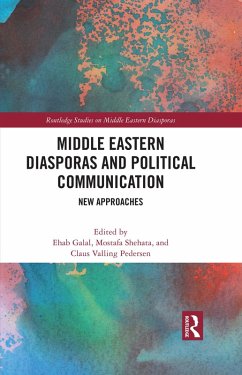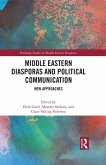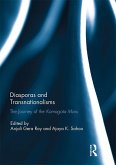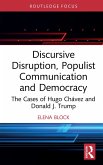Middle Eastern Diasporas and Political Communication (eBook, PDF)
New Approaches
Redaktion: Galal, Ehab; Pedersen, Claus Valling; Shehata, Mostafa
42,95 €
42,95 €
inkl. MwSt.
Sofort per Download lieferbar

21 °P sammeln
42,95 €
Als Download kaufen

42,95 €
inkl. MwSt.
Sofort per Download lieferbar

21 °P sammeln
Jetzt verschenken
Alle Infos zum eBook verschenken
42,95 €
inkl. MwSt.
Sofort per Download lieferbar
Alle Infos zum eBook verschenken

21 °P sammeln
Middle Eastern Diasporas and Political Communication (eBook, PDF)
New Approaches
Redaktion: Galal, Ehab; Pedersen, Claus Valling; Shehata, Mostafa
- Format: PDF
- Merkliste
- Auf die Merkliste
- Bewerten Bewerten
- Teilen
- Produkt teilen
- Produkterinnerung
- Produkterinnerung

Bitte loggen Sie sich zunächst in Ihr Kundenkonto ein oder registrieren Sie sich bei
bücher.de, um das eBook-Abo tolino select nutzen zu können.
Hier können Sie sich einloggen
Hier können Sie sich einloggen
Sie sind bereits eingeloggt. Klicken Sie auf 2. tolino select Abo, um fortzufahren.

Bitte loggen Sie sich zunächst in Ihr Kundenkonto ein oder registrieren Sie sich bei bücher.de, um das eBook-Abo tolino select nutzen zu können.
This edited book explores the development and reconfiguration of Middle Eastern diasporic communities in the West in the context of increased political turmoil, civil war, new authoritarianism, and severe constraints on media in the Middle East.
- Geräte: PC
- mit Kopierschutz
- eBook Hilfe
Andere Kunden interessierten sich auch für
![Middle Eastern Diasporas and Political Communication (eBook, ePUB) Middle Eastern Diasporas and Political Communication (eBook, ePUB)]() Middle Eastern Diasporas and Political Communication (eBook, ePUB)42,95 €
Middle Eastern Diasporas and Political Communication (eBook, ePUB)42,95 €![Diasporas and Transnationalisms (eBook, PDF) Diasporas and Transnationalisms (eBook, PDF)]() Diasporas and Transnationalisms (eBook, PDF)46,95 €
Diasporas and Transnationalisms (eBook, PDF)46,95 €![Transnational Public Spheres (eBook, PDF) Transnational Public Spheres (eBook, PDF)]() Mohammadbagher ForoughTransnational Public Spheres (eBook, PDF)44,95 €
Mohammadbagher ForoughTransnational Public Spheres (eBook, PDF)44,95 €![Social Mentality and Public Opinion in China (eBook, PDF) Social Mentality and Public Opinion in China (eBook, PDF)]() Fanbin ZengSocial Mentality and Public Opinion in China (eBook, PDF)42,95 €
Fanbin ZengSocial Mentality and Public Opinion in China (eBook, PDF)42,95 €![Israel at the Polls 2013 (eBook, PDF) Israel at the Polls 2013 (eBook, PDF)]() Israel at the Polls 2013 (eBook, PDF)34,95 €
Israel at the Polls 2013 (eBook, PDF)34,95 €![Discursive Disruption, Populist Communication and Democracy (eBook, PDF) Discursive Disruption, Populist Communication and Democracy (eBook, PDF)]() Elena BlockDiscursive Disruption, Populist Communication and Democracy (eBook, PDF)21,95 €
Elena BlockDiscursive Disruption, Populist Communication and Democracy (eBook, PDF)21,95 €![Towards a New Paradigm on Post-truth (eBook, PDF) Towards a New Paradigm on Post-truth (eBook, PDF)]() Anam KuraishiTowards a New Paradigm on Post-truth (eBook, PDF)40,95 €
Anam KuraishiTowards a New Paradigm on Post-truth (eBook, PDF)40,95 €-
-
-
This edited book explores the development and reconfiguration of Middle Eastern diasporic communities in the West in the context of increased political turmoil, civil war, new authoritarianism, and severe constraints on media in the Middle East.
Dieser Download kann aus rechtlichen Gründen nur mit Rechnungsadresse in A, B, BG, CY, CZ, D, DK, EW, E, FIN, F, GR, HR, H, IRL, I, LT, L, LR, M, NL, PL, P, R, S, SLO, SK ausgeliefert werden.
Produktdetails
- Produktdetails
- Verlag: Taylor & Francis eBooks
- Seitenzahl: 198
- Erscheinungstermin: 14. August 2023
- Englisch
- ISBN-13: 9781000910094
- Artikelnr.: 68263864
- Verlag: Taylor & Francis eBooks
- Seitenzahl: 198
- Erscheinungstermin: 14. August 2023
- Englisch
- ISBN-13: 9781000910094
- Artikelnr.: 68263864
- Herstellerkennzeichnung Die Herstellerinformationen sind derzeit nicht verfügbar.
Ehab Galal is an Associate Professor at the University of Copenhagen. He is the Project Leader of "Mediatized Diaspora: Contentious Politics among Arab Media Users in Europe." His research focuses on Arab media, Islamic television, regime-critical media, media and migration, Arab media audiences, and mediatized diaspora. Mostafa Shehata is a Lecturer of Media and Digital Communication in the Faculty of Mass Communication, Menoufia University, Egypt, as well as Associate Researcher at the University of Copenhagen, Denmark. He holds a PhD from Roskilde University in Denmark. His research focus is on political communication, intercultural communication, social movement, migration, and the Middle East. Claus Valling Pedersen is an Associate Professor in Persian at the Department of Cross-Cultural and Regional Studies, University of Copenhagen. His main research interest is in modern literature from Iran, spanning the period from about year 1900 until today, and most of his publications are about literature. He has also completed research on contemporary Iranian history, society, and religion.
1. Mobilizing and Mediatizing Middle Eastern Diaspora 2. Diasporic
Political Communication among Arabs in Europe: From Online Campaigning to
Friendship Networks 3. The Power of the Media in Mobilizing Diaspora
Support for Syrian Armenians: The Case of Kessab 4. Beirut from 'October
Revolution' of 2019 to the 4th August Explosion in 2020: Transnational
Solidarity, Social Media and Affective Communities 5. The Webinar as Tool
for Diasporic Political Communication to Counter Mis/disinformation About
Syria 6. Arab Social Media News in Sweden: Site of Information or Site of
Struggle? 7. Digital Diaspora: The Case of Farkhunda and Afghan Women's
Resistance 8. Whom do the Diaspora Members Interact with when there are
Elections in the 'Homeland?' 9. Making an Impact: The Role of Media
Activism among Bahrainis in London and Denmark 10. Reporting on Syrian
Conflict from Exile: Examining Advocacy Strategies in Diaspora Journalists'
Online News
Political Communication among Arabs in Europe: From Online Campaigning to
Friendship Networks 3. The Power of the Media in Mobilizing Diaspora
Support for Syrian Armenians: The Case of Kessab 4. Beirut from 'October
Revolution' of 2019 to the 4th August Explosion in 2020: Transnational
Solidarity, Social Media and Affective Communities 5. The Webinar as Tool
for Diasporic Political Communication to Counter Mis/disinformation About
Syria 6. Arab Social Media News in Sweden: Site of Information or Site of
Struggle? 7. Digital Diaspora: The Case of Farkhunda and Afghan Women's
Resistance 8. Whom do the Diaspora Members Interact with when there are
Elections in the 'Homeland?' 9. Making an Impact: The Role of Media
Activism among Bahrainis in London and Denmark 10. Reporting on Syrian
Conflict from Exile: Examining Advocacy Strategies in Diaspora Journalists'
Online News
1. Mobilizing and Mediatizing Middle Eastern Diaspora 2. Diasporic
Political Communication among Arabs in Europe: From Online Campaigning to
Friendship Networks 3. The Power of the Media in Mobilizing Diaspora
Support for Syrian Armenians: The Case of Kessab 4. Beirut from 'October
Revolution' of 2019 to the 4th August Explosion in 2020: Transnational
Solidarity, Social Media and Affective Communities 5. The Webinar as Tool
for Diasporic Political Communication to Counter Mis/disinformation About
Syria 6. Arab Social Media News in Sweden: Site of Information or Site of
Struggle? 7. Digital Diaspora: The Case of Farkhunda and Afghan Women's
Resistance 8. Whom do the Diaspora Members Interact with when there are
Elections in the 'Homeland?' 9. Making an Impact: The Role of Media
Activism among Bahrainis in London and Denmark 10. Reporting on Syrian
Conflict from Exile: Examining Advocacy Strategies in Diaspora Journalists'
Online News
Political Communication among Arabs in Europe: From Online Campaigning to
Friendship Networks 3. The Power of the Media in Mobilizing Diaspora
Support for Syrian Armenians: The Case of Kessab 4. Beirut from 'October
Revolution' of 2019 to the 4th August Explosion in 2020: Transnational
Solidarity, Social Media and Affective Communities 5. The Webinar as Tool
for Diasporic Political Communication to Counter Mis/disinformation About
Syria 6. Arab Social Media News in Sweden: Site of Information or Site of
Struggle? 7. Digital Diaspora: The Case of Farkhunda and Afghan Women's
Resistance 8. Whom do the Diaspora Members Interact with when there are
Elections in the 'Homeland?' 9. Making an Impact: The Role of Media
Activism among Bahrainis in London and Denmark 10. Reporting on Syrian
Conflict from Exile: Examining Advocacy Strategies in Diaspora Journalists'
Online News







